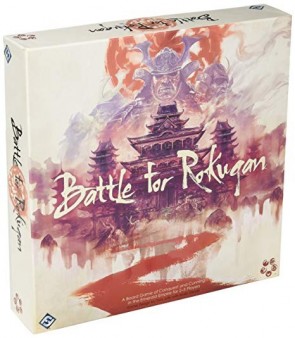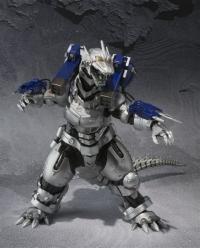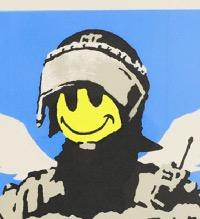The first counter goes down on the board, sliding off the owner's thumb with a satisfying thwack. Its arrowhead points at my capital like an accusation. Besides that, I'm clueless. What is it? Given that it's sat on a territory border, it's either an army or a bluff. But if it's real, how many samurais are rolling in my direction? My palms begin to sweat. What do I need to do to defend myself?
Helpless, I look up at the owner of the piece, who smirks the smug smirk of someone in the know. And I am empowered by the truth. Whatever I pick from behind my screen to defend and slide face down on the board, she'll be equally clueless as to what it is.
The opening few placements unfold with similar hesitancy, blind players feeling our way around a new world. It's called Rokugan and it's obviously a generic take on fantasy Asia. But aside from the brush art and pastel colours, I couldn't care less. I am absorbed in trying to work out what's likely to be underneath those sinister little discs threatening my territory. The land could be anywhere. In particular it could be Westeros, seeing as there are a bunch of mechanical similarities with the Game of Thrones board game.
But where that buries players in time and complexity, Battle for Rokugan is light and fast. It abstracts all the fussy raising and movement of troops away in favour of a blind selection of five counters per turn. You can then use armies to attack from any province you own, navies to attack any coast and Shinobi to attack anywhere at all. It abstracts asymmetry down to a single player power and the counter mix. You can teach it in minutes and play in an hour or two.
After we've each placed five face-down counters we sit, looking at them like they're manholes into a terrifying underworld. No one wants to be first to flip and start the resolution. The stakes are too high to cope with and it's only the first round. We agree to start at the north and work down.
The first reveal is the threat that opened the game. I could have placed a counter to defend, but I decided not to. Capitals get a default defence, so I guessed the attack was a bluff, a blank counter: we all get one each turn if we want. Instead, I used my precious forces to push elsewhere. I find my breath caught at the counter turns and ... I was right. My city stays safe.
And so we collapse the board like a set of dominoes, winners determined by simple majority of strength. Empty territories get conquered, others change hands with a whistle of breath and a tightening of arse cheeks. And so we set up for the second round, re-inflating the tension like the rising whine of a set of bagpipes. I don't know how I'm going cope with five full turns of this.
At the start of the second turn, a couple of us have conquered whole sets of territories. These will be worth bonus points at the end, in addition to the individual honour value of each province we own. But right now they're worth something more valuable: a card. These are like gold dust because each province set only has one, picked at random from a pair, and once it's played, it's out of the game. So it's on me to play mine as soon as possible. It makes one of my provinces worth another four honour, so I put it in my capital with its default defence.
After one turn, we've all turned into Machiavelli. Now, as we slap down each counter with a threat, a tease, a winsome smile. Yes, of course it's a bluff! No, that's not a raze counter that will reduce the entire province to worthless ash! Yes, of course we won't attack each other until one of us is in the lead! All as worthless as the air they're uttered with ... or are they?
Swirling chaos, peppered with islands of social guesswork. Except that Rokugan doesn't want that to be the whole of the game, so it teases us with information, a twinkle in its cardboard eye. We all have two cards that we can use to look at hidden at units on the board. Two, for the entire game. Whoever has the disadvantage of the first turn gets a similar power. So valuable, yet so scarce: choosing when to play one is like deciding between fingers to cut off. And what do we do with the detail when we have it? Set up elaborate double bluffs, of course.
Three turns of fluid brutality flow by in what seems like forever and no time at all. At the end of it, I'm sitting pretty. Everyone went for my extra-honour province like bees to honey, of course, but that was my plan. It left me with a strongpoint to defend. And in Battle for Rokugan, a successful carries its own advantages. The province gets an extra default army and becomes worth an extra point. After two defences, plus the capital, it looks impregnable.
Then, the player on my left flips down her newly acquired card. It exchanges ownership of two provinces, just like that. She gets my strongpoint, I get a lousy 1-honour province in a territory whose card has long gone. It dawns on me that although the rules are easy to teach, it would be useful to know what all the possible cards in play might be. But there's no reference to help.
Over the course of the turn, one turn, my world collapses. I've drawn and used most of my strongest counters. I've drawn and used the only territory cards I'm likely to be able to get over the game. But I'm not out yet: I have a secret objective. I need to conquer a bunch of coastal provinces for a sweet basket of bonus points. Plus, there's always the bluff. If I smile and wink and nod to the right people in the right places, I might get away with it.
The final turn is just the placing of five counters, just like all the others, but it's a bloodbath. Those who have cards left play them, gobbling up information like the information-starved warlords they are. No-one uses their bluff counter in the rush to grab territory. And when the dust settles, I'm left one province short of my objective and my points total is paltry.
As others turn over their own secret goals, a shock. A couple of the players have cards tasking them to own the capitals of their own clans. Given that capitals get that defence bonus, this is likely guaranteed. One of them wins the game, which tastes a little sour until I remember how delicious the main course was.
I throw counters into the box and head into the night, full of excitement and beer and plans. Next time - and there will be many next times - I'll print out a card reference to teach. Next time - and there will be many - I'll ask anyone dealt their own objective to hand it back for another. Next time - and there will be very many - I'll keep the right counters, time the right cards, guess the right guesses. I never do, of course. But that's okay: what fun would life, or Battle for Rokugan, be if we knew the future?
 Games
Games How to resolve AdBlock issue?
How to resolve AdBlock issue? 
























